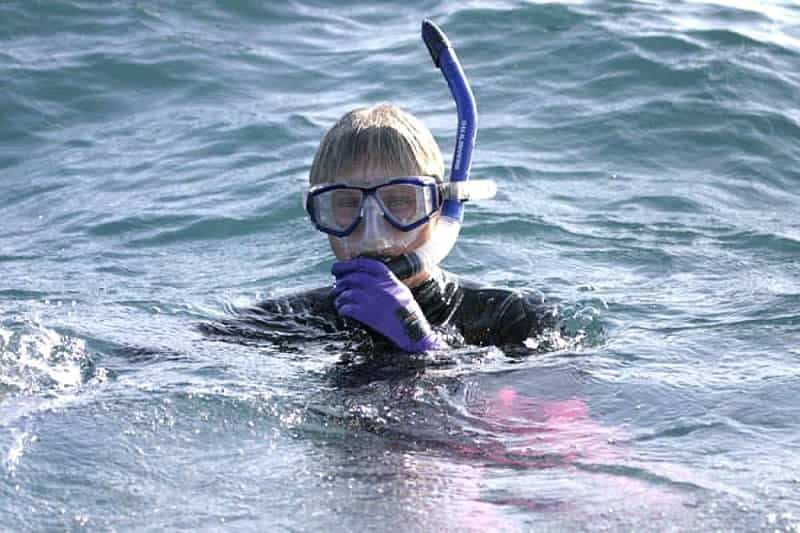Before she begins her 1,100-kilometer swim, Renate Herberger always sings a song to the African goddess Yemaya, who watches over the sea. A self-described Pagan, Herberger asks Yemaya for permission to enter the endless Pacific. On Monday, Jan. 27, she will sing that song again.
“I hear about these Mt. Everest climbers,” she says. “For them, it is man against nature. For me, it’s the opposite. I don’t fight the ocean. It is has a sweetness to it. The longer I swim, the quieter my mind becomes.”
This mentality works wonders: Herberger has swum the length of Costa Rica’s Pacific shore six times before, once annually since 2008. This year marks her seventh – and final – attempt, as she once again raises awareness for the marine environment. Herberger is interested in a variety of aquatic concerns, from Californian sea turtles to wild salmon, but in Costa Rica, Herberger is most preoccupied by coral reefs, which have been dying at an unprecedented rate in recent decades.
“It makes your heart break, out in the ocean,” Herberger says. “This is a moment of a real emergency.”
A native of Baden-Baden, Germany, Herberger is a trained dancer and dance therapist. She spends her summers in Germany as a kayak guide, and she is also a certified water therapist. She has taught five languages in classrooms around the world. At 55, Herberger is energetic and fast-talking, and laughs heartily. Her English is so excellent that her accent is hard to discern. When she was 4 years old, she learned how to swim, and her passion grew exponentially from there. “If things went wrong in my life, I would have a swim,” she says.
During a teaching stint in Mexico, Herberger started taking longer swims in the ocean. While Herberger has always been a strong athlete, the distance and tidal shifts were dangerous for a solo swimmer. But Herberger feels most comfortable in the water, in part for health reasons: She suffers the aftereffects of thrombosis, or blot clotting in her legs, and aquatic sports are the most effective physical therapy. “I must swim every day,” Herberger says, “or else I become very sick.”
Herberger has taken her long-distance swimming to Costa Rica and Mexico, and she has even circled the island of Barbados. During her first visit in Costa Rica, she vowed to complete seven swims altogether, a number that seems to hold special significance to her. These migratory swims always carry the weight of activism, for Herberger routinely stops at schools and communities and gives presentations. During some trips, she will spend more time lecturing than swimming, and a single route can take four months. She makes time to maintain a website, Costa Rica Mermaid, that explains the purpose of her sojourns.
On the road, Herberger travels with little more than a backpack (largely weighed down with books), but she requires certain provisions: an aide, who floats alongside in a kayak or small boat, to hand her water every 30 minutes. (She does not permit the boat to have an outboard motor, to avoid the use of fuel). In an emergency, the aide will haul Herberger out of the ocean and bring her ashore. She also employs fins, goggles, and often a snorkel, but she avoids plastic water bottles, because such disposable containers have caused untold damage in the Pacific. When she arrives in a new community, Herberger has to secure accommodations. In the past, hotels have often invited her to stay for free.
But after a long string of lucky breaks, Herberger has lost many of her sponsors, and this time she feels less bolstered by the generosity of strangers. Where boats and lodging previously came at little or no cost, Herberger has to pay for nearly everything herself. She will rely largely on a credit card with a $10,000 limit. When she speaks at schools – a free engagement – she will request to stay with a staff member instead of paying for lodging. Because of scheduling conflicts, she has cut her usual itinerary in half, from four months to two.
Such a rigorous passion has been hard for Herberger: She unexpectedly lost her youngest child in 2011 and received the news in the middle of her third Costa Rican swim. After dealing with the death, Herberger returned to Costa Rica to finish the journey. “It was the most terrible news a mother could have,” she says. “Swimming was the only thing that was keeping me alive.”
More recently, Herberger visited a pool in Mexico and decided to try a waterslide. She landed badly and injured herself – a broken rib and torn tendons in her arms. That accident won’t prevent her from swimming, but Herberger curses the irony of it.
“It’s so ridiculous. It’s so stupid,” she says, cackling bitterly. “I’ve swum 6,420 kilometers so far! I’ve swum with sharks! I’ve swum with whales! But that stupid, stupid waterslide!”
Still, Herberger will attempt a final swim, and then she will say farewell to Costa Rica. She will face physical hurdles as well as financial handicaps, as well as the sheer distance.
When asked how her friends in small-town Germany respond to her double-life as a long-distance swimmer, she bursts into laughter.
“They probably think I’m completely nuts!” she says. But to Herberger, the process is the most natural thing she can do. “I’m not a particularly fast swimmer, but I last. I simply don’t get tired. At a moderate pace, I can go much farther. I just surrender to the ocean. I hand over my life force to her.”






